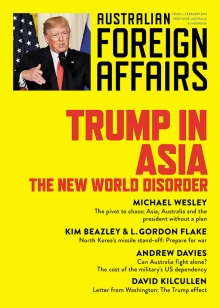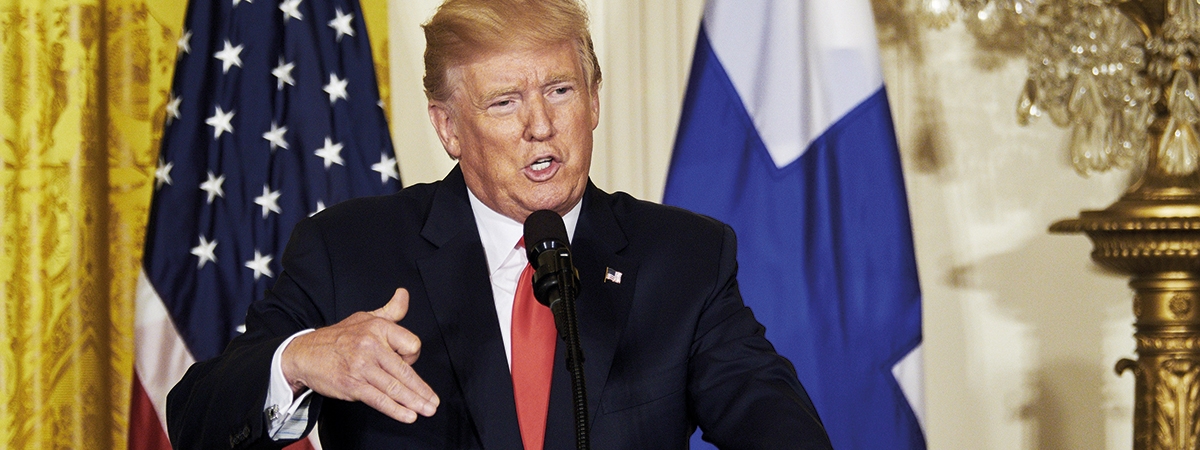
This extract is featured in Australian Foreign Affairs 2: Trump in Asia.
To read the full issue, log in, subscribe or buy the issue.
No American president – indeed, no modern celebrity – has so monopolised our attention as Donald Trump. Rarely is the T-word far from the centre of conversation and consciousness; it’s a trigger for humour, outrage, despair and mystification. A dollop of the Donald brings effervescence to any discussion. Trump has become the harbinger of so much that alarms us in our contemporary world: populism, political polarisation, crass consumerism, middle-class despair, the decay of respect and moral standards.
Except in Asia. Obsession with Trump is a Western phenomenon. Of course, the forty-fifth American president is discussed in Asian societies, but not with the same intensity as in the West. To travel to Asia is to enter – blissfully – a Trump-muted zone, free from the saturation coverage of every tweet and micro-detail in the White House soap opera. The American president is spoken about, but in a business-like, unemotional way – and then the conversation moves on. Talking about US foreign policy in Jakarta, New Delhi or Manila reminds one of what such discussion was like in our society before Trump was elected.
And yet the impact of Trump will arguably be greater in Asia than in any other region. Asia has relied heavily on American power, rather than on institutions and rules, to provide the stability that has allowed the region’s astonishingly rapid development. It is also where a rising China represents the most determined and sustainable challenge to American power. Asian states are not blind to the sudden change of direction in American foreign policy delivered by the Trump administration. They simply view American power differently to us. Understanding this difference will be essential to how Australia adjusts its relations with its region during the Trump era.
...
The Western allies of the United States [have] interpreted American might in moral terms: as the natural outcome of the evolution of history towards democracy, the rule of law, free markets, cosmopolitan equality and the globalised concord of nations. American power, as the ultimate expression of irreversible human progress, was assumed to be unassailable and unchallengeable. It was the moral interpretation of American power that provoked such outrage when that power was seen to be misused during the invasion of Iraq in 2003.
Beyond its Muslim-majority countries, no such outrage occurred in Asia, because in this region, power is generally regarded in much more matter-of-fact, material terms. Asian societies’ long memories of the rise and fall of empires, and cycles of subjugation and conquest, dispose them to view power more dispassionately. Despite cultural traditions that hold to a belief in divinely sanctioned rule, Asian societies tend to view power beyond their borders as an inevitable occurrence, to be harnessed, resisted or avoided as the circumstances dictate.
...
To Asian policymakers, it’s obvious that the pattern of international power is shifting. It’s understandable and probably inevitable; as in the past, the region will reorient itself. Just as these policymakers read American power in material, not moral, terms, so they understand China’s surging power in matter-of-fact ways. It’s a laconic view of power that only a long-term, cyclical conception of supremacy and decline can impart.
Australia needs to be similarly dispassionate about the way power is shifting in its region. The advent of Trump calls for a fundamental rethinking of Australia’s strategy towards the Asia-Pacific. Such a rethink has long been needed, but with Obama and his predecessors, we hid behind a hope that American power and resolve would prevail once again. Trump tears away any excuse for wishful thinking. For the past quarter-century, Canberra’s policy has been to support American primacy and US efforts to prevent the rise of rivals. Trump’s election forces us to confront the failure of that policy and the implausibility of the restoration of America’s position of dominance. Rather, Australian policymakers must acknowledge the overwhelming reality that our future will increasingly be shaped by Beijing, not by Washington.
The Australian debate on the US alliance misses the point entirely. We should neither summarily break the alliance nor blindly deepen our investment in it. We should keep the alliance with the US but reshape it towards ensuring an enduring American role in the emerging Asian power balance, just as we reshaped the alliance towards a different rationale at the end of the Cold War. We need to become as unromantic about American power as our northern neighbours. American power will endure, but the US will no longer be the arbiter of the regional order. We should therefore make sure that we use our alliance with the United States to help secure what we regard as an acceptable and achievable environment in the Asia-Pacific.







